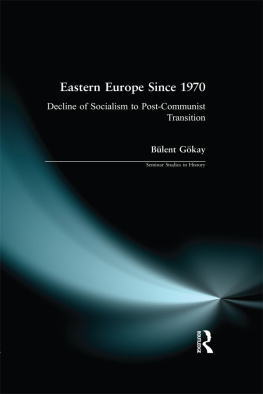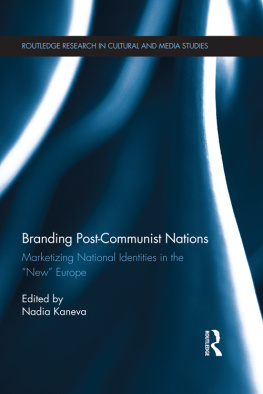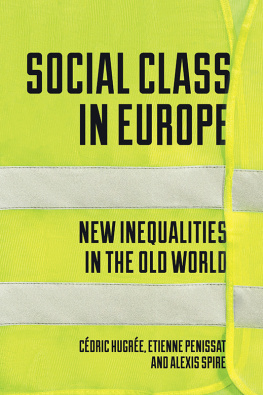Class Cultures in Postsocialist Eastern Europe
This book investigates the extent to which social class has changed in Eastern Europe since the fall of communism. Based on extensive original research, the book discusses how ideas about class are viewed by both working-class and middle-class people. The book examines how such peoples social identities are shaped by various factors including economic success, culture, and friendship networks. The present class situation in Eastern Europe is contrasted to what prevailed in communist times, when societies were officially classless, but nevertheless had Communist Party elites.
Draen Cepi is a postdoctoral researcher in the Department of Sociology at the University of Zadar, Croatia, and completed his doctorate at the European University Institute, Florence.
BASEES/Routledge Series on Russian and East European Studies
Sociology and anthropology: Judith Pallot (President of BASEES and Chair), University of Oxford; economics and business: Richard Connolly, University of Birmingham; media and cultural studies: Birgit Beumers, University of Aberystwyth; politics and international relations: Andrew Wilson, School of Slavonic and East European Studies, University College London; history: Matt Rendle, University of Exeter.
This series is published on behalf of BASEES (the British Association for Slavonic and East European Studies). The series comprises original, highquality, research-level work by both new and established scholars on all aspects of Russian, Soviet, post-Soviet and East European Studies in humanities and social science subjects.
Inside the East European Planned Economy
State Planning, Factory and Manager
Voicu Ion Sucal
Ideology and Social Protests in Eastern Europe
Beyond the Transitions Liberal Consensus
Veronkia Stoyanova
Belarus under Lukashenka
Adaptive Authoritarianism
Matthew Frear
Class Cultures in Postsocialist Eastern Europe
Draen Cepi
Belarus Alternative Visions
Nation, Memory and Cosmopolitanism
Aram Rafaat
Russian Culture in the Era of Globalisation
Edited by Vlad Strukov and Sarah Hudspith
Security, Society and the State in the Caucasus
Edited by Kevork Oskanian and Derek Averre
First published 2019
by Routledge
2 Park Square, Milton Park, Abingdon, Oxon OX14 4RN
and by Routledge
711 Third Avenue, New York, NY 10017
Routledge is an imprint of the Taylor & Francis Group, an informa business
2019 Draen Cepi
The right of Draen Cepi to be identified as author of this work has been asserted by him in accordance with sections 77 and 78 of the Copyright, Designs and Patents Act 1988.
All rights reserved. No part of this book may be reprinted or reproduced or utilised in any form or by any electronic, mechanical, or other means, now known or hereafter invented, including photocopying and recording, or in any information storage or retrieval system, without permission in writing from the publishers.
Trademark notice: Product or corporate names may be trademarks or registered trademarks, and are used only for identification and explanation without intent to infringe.
British Library Cataloguing-in-Publication Data
A catalogue record for this book is available from the British Library
Library of Congress Cataloging in Publication Data
A catalog record has been requested for this book
ISBN: 978-1-138-32136-6 (hbk)
ISBN: 978-0-429-45257-4 (ebk)
This book was developed from my doctoral thesis which I defended in 2013 at European University Institute (EUI) in Florence. I am grateful to Graham Allan, Jrg Rssel, and Lszl Bruszt, for their insightful comments and hard questions as members of the jury, and especially to my supervisor Martin Kohli, for his continuous support and excellent guidance. I would like to thank all my colleagues and professors who read parts of this manuscript during colloquia and research seminars, as well as to audiences at various conferences where I presented my research. Special thanks go to my friends and colleagues from EUI, who made the whole doctoral experience pleasant, warm, and even fun.
After a four-year hiatus, the key encouragement to develop my thesis into a book came from Karin Doolan. She generously supported me to work on the book as part of my current research project, while the Department of Sociology at University of Zadar has provided a warm and inspiring work environment. In working on the manuscript, I found great support in Routledge, where comments from my editor Peter Sowden were encouraging, timely, and spot on.
During my fieldwork in Zagreb and akovec, assistance provided by various organizations was greatly appreciated: officials from the Architects Chamber of Zagreb, Croatian Trade Union of Medical Workers, Croatian Association of Accountants, Trade Union of Textile Workers, Trade Union of Metal Workers, Trade Union of Oil Workers, and Trade Union of Science and Higher Education have been a great help in my search for interviewees. To each and every one of my interviewees I owe my sincere gratitude for giving me their time and letting me into their lives.
I would like to convey thanks to the following institutions who supported my work financially from 2008 to 2012: Italian Ministry of Foreign Affairs; Open Society Foundations; Croatian Ministry of Science, Education and Sport; Frankopan Fund Sainsbury Family Charitable Trusts; and EUI, which provided ideal conditions for conducting and completing my research. While preparing the thesis for publication from 2017 to 2018, I have worked on the Croatian Science Foundation-funded project Social Stratification in Croatia: Structural and Subjective Aspects.
Lastly, Marija Krni provided emotional support and keen readership during the writing of my thesis while I was a doctoral student in Florence, just as she has now, several years later, when I have been preparing it for this book publication.
May 2018, Zagreb
The three waves of the EU eastern enlargement in 2004, 2008, and 2013, when 11 postsocialist countries became EU member states, were largely seen as a milestone in the process of European integration. The accession of the Czech Republic, Estonia, Hungary, Latvia, Lithuania, Poland, Slovakia, Slovenia, Romania, Bulgaria, and Croatia indicated that the border which had for decades divided the continent would be transcended. Even though the integration could obviously not be achieved at once, the inclusion of the countries which were catching up with their western neighbours in terms of economic and political reforms, represented an important step in achieving this goal. While the end of the Cold War made Europeans euphoric, Kauffman argues, joining NATO and the European Union was the icing on the cake: In 2008, with end of history hubris, a World Bank report proclaimed that the transition was over. Mission accomplished (2016). Very soon, however, it became clear that the cooperation between the old and the new member states would not go as smoothly as predicted.
While at first it was assumed that there would be no more divisions on the western and eastern parts of the continent, transition was the key term. The concept of transition meant to imply that Eastern Europe was heading from one state (communism) to another state (democracy, capitalism), whereas the boundaries of Europe would be shifted further eastwards. The demise of the counter social paradigm, according to some, completed a centuries-long project of modernization and marked a new era of unchallenged dominance of a single logic of organization (Stark and Bruszt 1998: 2). However, scholars began to question the notion that this change is indeed happening in such a straightforward fashion. The countries of Eastern Europe indeed have converged with their western neighbours in several important ways, and yet media and political discourse kept generating new concepts which segregated postcommunist countries. The term East-Central Europe was coined for Eastern European nations which were once regarded as Central Europe a geopolitical entity which in the late nineteenth and early twentieth centuries, under Metternichs conception of a European concert of powers, served to provide a political balance between the western powers, Britain and France, and the eastern superpower, Russia (Hroch 2000: 23). The concept of postsocialism addressed the common history of state socialism, although it remained unclear for how long this, supposedly, temporary label will keep having an impact on the actualities of Eastern European societies.1 The most recent of them, New Europe has also been used to distinguish Eastern European states from the countries of the Old Europe.








